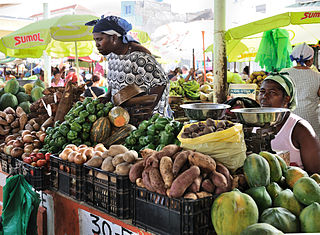Related Research Articles
Cape Verdean Americans are an ethnic group of Americans whose ancestors were Cape Verdean. In 2010, the American Community Survey stated that there were 95,003 Americans living in the US with Cape Verdean ancestors.
A Portuguese Luxembourger or Lusoburguês is a citizen of Luxembourg that either was born in Portugal or is of Portuguese ancestry. Although estimates of the total Portuguese Luxembourg population vary, in 2013 there were 82,363 people in Luxembourg with Portuguese nationality. They constitute 16.1% of the population of Luxembourg, making them the largest group of foreigner citizens living in the country.
Cape Verdeans in Canada are Canadian residents whose ancestry originated in Cape Verde.
There are 186,817 people residing in São Tomé and Príncipe according to a 2013 estimate published in the CIA World Factbook. Of these, Cape Verdeans and their descendants make up about 3,000 people. They account for more than half of the 6,000 strong population of the island of Príncipe, which in turn accounts for only about 5% of the total population. Most of the Cape Verdeans in the island nation live in poverty.
Cape Verdean Argentines are Argentine residents whose ancestry originated in Cape Verde. According to the 1980 census, there were about 8,000; but today's population was estimated by some sources to be around 2,000 in 2007. Other sources estimate that in 2006 there were 12,000-15,000 descendants of immigrants from Cape Verde living in Argentina, of whom about 300 are native to the African continent.
Cape Verdean Mozambican are Mozambican residents whose ancestry originated in Cape Verde.
Cape Verdeans in France are residents of France who are from Cape Verde or have Cape Verdean ancestry.
In 1995, it was estimated that there were 50,000 people of Cape Verdean descent or national origin in Portugal. By 2000, this estimation rose to 83,000 people, of which 90% resided in Greater Lisbon." In 2008, Portugal’s National Statistics Institute estimated that there were 68,145 Cape Verdeans who legally resided in Portugal. This made up "15.7% of all foreign nationals living legally in the country."
Cape Verdeans in the Netherlands consist of migrants from Cape Verde to the Netherlands and their descendants. As of 2010, figures from Statistics Netherlands showed 20,961 people of Cape Verdean origin in the Netherlands.
Cape Verdeans in Sweden are citizens and residents of Sweden who are of Cape Verden descent. In 1995, it was estimated that there were 3,000 people of Cape Verdean descent in Scandinavia. One of the most famous Swedes of Cape Verdean descent is footballer Henrik Larsson, who was born to a Cape Verdean father and a Swedish mother, his son Jordan Larsson is also now a full Swedish international after being born in Rotterdam, in the Netherlands.
Cape Verdean Angolan are Angolan residents whose ancestry originated in Cape Verde.
There were estimated to be 25,000 Cape Verdeans in Senegal as of 1995.
The presence of Cape Verdeans in Italy dates back to the 1960s.
Cape Verdean Spaniards are residents of Spain whose ancestry originated in Cape Verde.
Cape Verdean Gabonese are Gabonese residents whose ancestry originated in Cape Verde.
Cape Verdean Ivorian are Ivorian residents whose ancestry originated in Cape Verde.
Cape Verdean Cuban are Cuban citizens or residents whose ancestry originated in Cape Verde.

The economy of Cape Verde is a service-oriented economy that is focused on commerce, trade, transport and public services. Cape Verde is a small archipelagic nation that lacks resources and has experienced severe droughts. Agriculture is made difficult by lack of rain and is restricted to only four islands for most of the year. Cape Verde's economy has been steadily growing since the late 1990s, and it is now officially considered a country of average development, being only the second African country to have achieved such transition, after Botswana in 1994. Cape Verde has significant cooperation with Portugal at every level of the economy, which has led it to link its currency first to the Portuguese escudo and, in 1999, to the euro.

Cape Verde or Cabo Verde, officially the Republic of Cabo Verde, is an archipelago and island country in the central Atlantic Ocean, consisting of ten volcanic islands with a combined land area of about 4,033 square kilometres (1,557 sq mi). These islands lie between 600 to 850 kilometres west of Cap-Vert situated at the westernmost point of continental Africa. The Cape Verde islands form part of the Macaronesia ecoregion, along with the Azores, the Canary Islands, Madeira, and the Savage Isles.
Cape Verdeans, also called Cabo Verdeans, are the citizens of Cape Verde, an island nation in West Africa consisting of an archipelago in the central Atlantic Ocean. Cape Verde is a sociedade mestiça, which means that it is home to mixed-race people, whose ethnogenesis is in Cape Verde, which has no indigenous population.
References
- ↑ 1995 Cape Verdean Diaspora Population Estimates Archived 2009-08-29 at the Wayback Machine
- ↑ Marc-Montclos, Antoine Pérouse de. " The Political Value of Remittances: Cape Verde, Comores, and Lesotho - Diasporas, Remittances and Africa South of the Sahara - A Strategic Assessment." Institute for Security Studies. Retrieved October 18, 2007. Archived February 29, 2008, at the Wayback Machine